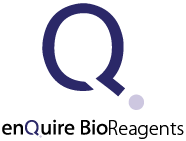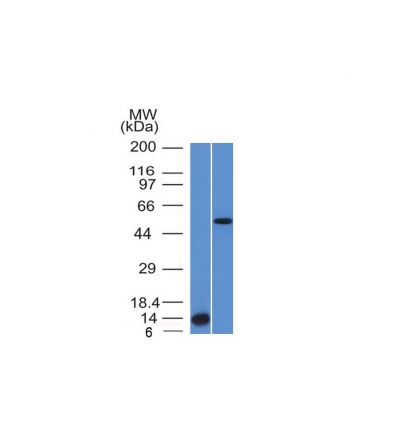Human Anti-ALK Antibody Product Attributes
Species: Human
Tested Applications: Western Blot.
Clonality: Monoclonal
Anti-ALK Antibody Clone: ALK/1503
Clone ALK/1503 Host and Isotype: Mouse IgG1 kappa
Anti-Human ALK Positive Control Sample: Anaplastic Large Cell Lymphoma
Cellular Localization of Antibody Cytoplasmic and nuclear
Buffer and Stabilizer: 10mM PBS with 0.05% BSA and 0.05% Azide
Antibody Concentration: 200 ug/ml
Antibody Purification Method:Protein A/G Purified
Immunogen: Recombinant human ALK protein fragment (aa1360-1460)
Storage Conditions: Store at 2 to 8° C (refrigerate). Stable for 24 months when properly stored.
ALK Previously Observed Antibody Staining Patterns
Observed Subcellular, Organelle Specific Staining Data:
Anti-ALK antibody staining is expected to be primarily localized to the plasma membrane.Observed Antibody Staining Data By Tissue Type:
Variations in ALK antibody staining intensity in immunohistochemistry on tissue sections are present across different anatomical locations. An intense signal was observed in neuronal cells in the cerebral cortex and hippocampus and Purkinje cells in the cerebellum. More moderate antibody staining intensity was present in neuronal cells in the cerebral cortex and hippocampus and Purkinje cells in the cerebellum. Low, but measureable presence of ALK could be seen in cells in the endometrial stroma in endometrium, cells in the molecular layer in cerebellum, decidual cells in the placenta, endothelial cells in the cerebral cortex, epidermal cells in the skin, fibroblasts in mesenchymal tissue, germinal center cells in the lymph node, glandular cells in the adrenal gland, colon, endometrium, epididymis, fallopian tube, gallbladder, parathyroid gland, rectum, seminal vesicle and thyroid gland, hematopoietic cells in the bone marrow, Langerhans in skin, Leydig cells in the testis, macrophages in lung, myocytes in heart muscle and skeletal muscle, non-germinal center cells in the lymph node, ovarian stroma cells in the ovary, respiratory epithelial cells in the bronchus and nasopharynx, squamous epithelial cells in the cervix, uterine, oral mucosa and vagina, trophoblastic cells in the placenta and urothelial cells in the urinary bladder. We were unable to detect ALK in other tissues. Disease states, inflammation, and other physiological changes can have a substantial impact on antibody staining patterns. These measurements were all taken in tissues deemed normal or from patients without known disease.Observed Antibody Staining Data By Tissue Disease Status:
Tissues from cancer patients, for instance, have their own distinct pattern of ALK expression as measured by anti-ALK antibody immunohistochemical staining. The average level of expression by tumor is summarized in the table below. The variability row represents patient to patient variability in IHC staining.| Sample Type | breast cancer | carcinoid | cervical cancer | colorectal cancer | endometrial cancer | glioma | head and neck cancer | liver cancer | lung cancer | lymphoma | melanoma | ovarian cancer | pancreatic cancer | prostate cancer | renal cancer | skin cancer | stomach cancer | testicular cancer | thyroid cancer | urothelial cancer |
|---|---|---|---|---|---|---|---|---|---|---|---|---|---|---|---|---|---|---|---|---|
| Signal Intensity | + | - | - | + | + | + | + | + | + | - | + | - | + | ++ | - | + | + | + | + | + |
| ALK Variability | + | ++ | ++ | ++ | ++ | ++ | ++ | ++ | ++ | + | ++ | ++ | + | ++ | ++ | ++ | + | ++ | + | ++ |
Limitations and Warranty
enQuire Bio's ALK Anti-Human Monoclonal is available for Research Use Only. This antibody is guaranteed to work for a period of two years when properly stored.

.jpg)



-178x178.jpg)
There are no reviews yet.